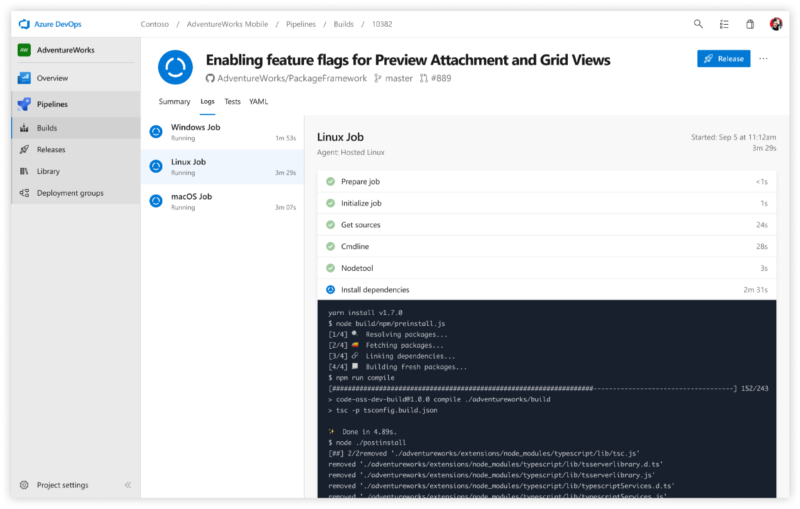
Visual Studio Team Services (VSTS), Microsoft's application lifecycle management system, is to undergo a major shake-up and rebranding. Instead of a single Visual Studio-branded service, it's being split into five separate Azure-branded services, under the banner Azure DevOps.
The five components:
- Azure Pipelines, a continuous integration, testing, and deployment system that can connect to any Git repository
- Azure Boards, a work tracking system with Kanban boards, dashboards, reporting
- Azure Artifacts, a hosting facility for Maven, npm, and NuGet packages
- Azure Repos, a cloud-hosted private Git repository service
- Azure Test Plans, for managing tests and capturing data about defects.
VSTS has been broken up in this way to further Microsoft's ambition of making its developer tooling useful to any development process and workflow, regardless of language or platform. The division into individual components should make it easier for developers to adopt portions of the Azure DevOps platform, without requiring them to go "all in" on VSTS. The reduced scope of each component means that it's cheaper than the VSTS pricing, making incremental adoption more palatable. For example, a Pipelines process could build and test a Node.js service from a GitHub repository and then deploy to a container on Amazon's AWS cloud, without requiring use of any of the other Azure DevOps components.
Microsoft is also making Pipelines available for free for open source projects. Open source developers will have unlimited build time and up to 10 parallel jobs. Pipelines has Windows, macOS, and Linux systems for testing, making it suitable for a wide range of projects, and the Atom and Visual Studio Code editors, and CPython and TypeScript programming languages, are already using Azure Pipelines for their building and testing. Azure Pipelines is also available through the GitHub Marketplace, making it easier to plumb into GitHub repositories.
Existing VSTS customers will have their projects migrated to Azure DevOps automatically; some URLs will change, but functionality should remain the same. This continuity explains one of the less obvious parts of Azure DevOps: Azure Repos. With Microsoft on track to buy GitHub, subject to regulatory approval, a second cloud-based Git repository service seems superfluous. However, Azure Repos is designed as an identical drop-in replacement/rebranding for the existing VSTS Git hosting capability.
This is also relevant to users of the on-premises Team Foundation Server, the approximate on-premises equivalent to VSTS. That product will be renamed to Azure DevOps Server, and will continue to track the cloud version (albeit with less frequent updates), so developers that don't or can't use the cloud for whatever reason will continue to have an option.
Listing image by Microsoft
reader comments
53